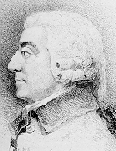

 Adam Smith (1723-1790)
Adam Smith (1723-1790)
Until comparatively recently, Adam Smith was known only as the author of a single book, An Inquiry
into the Nature and Causes of the Wealth of Nations, published in an easily remembered year, 1776,
the year of the American Revolution; this book that is said to have established economics as an autonomous
subject and, at the same time, to have launched the doctrine of free enterprise upon an unsuspecting
world. It is true that he also published another major treatise, The Theory of Moral Sentiments
(1759), a work about those standards of ethical conduct that hold society together, but this was a
book that economists generally left unread; those that did read it found it superficially inconsistent
with The Wealth of Nations and were puzzled by Smith's failure ever to relate the two books to each
other. It is also true he wrote many essays on philosophical and literary subjects and over the years the
discovery of his lecture notes on justice and rhetoric suggest that he may have been working towards a
complete system of social science, which he never lived to complete. Nevertheless, these essays and
lecture notes were hard to come by and were usually dismissed as being of peripheral interest.
....
© Mark Blaug, Great Economists Before Keynes: An Introduction
to the Lives and Works of One Hundread Great Economists of the Past
, Brighton: Wheatsheaf, 1986. In Stauffer Library: HB76 .B62
1986t
 Adam Smith (1723-1790)
Adam Smith (1723-1790)

 Adam Smith (1723-1790)
Adam Smith (1723-1790)